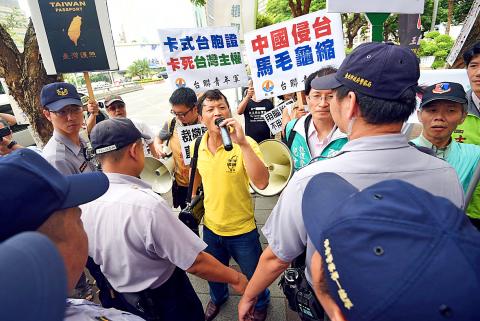Pro-independence groups yesterday rallied outside the Executive Yuan to call for the resignation of Premier Mao Chi-kuo (毛治國), following China’s decision to unilaterally replace the “Taiwan compatriot permit” (台胞證) with electronic cards.
“There is no way we can tolerate this kind of a premier,” 908 Taiwan Republic Campaign director Chen Chun-han (陳峻涵) said, criticizing Mao for saying that he only learned about China’s decision through media reports.
Chen said the Ministry of the Interior’s push to unify Taiwan’s National Identification Card with other government-issued ID cards might be connected with China’s electronic card push.

Photo: Lo Pei-der, Taipei Times
The “Taiwan compatriot permit” paper booklet is issued by the Chinese government and serves as the primary identification document for Taiwanese traveling in China. Following the Chinese announcement, people applying for a new “Taiwan compatriot permit” are issued an electronic card; existing paper permits remain valid until their expiry date, Beijing said.
Several protesters attempted to use a ladder to climb over the barricades surrounding the Executive Yuan, but were stopped by police. Chen then climbed into a nearby tree, shouting slogans calling for Mao to resign.
Protesters also handed a paper model of an iPad to police officers, saying it symbolized the need for Mao to be better connected with current events.
“China’s issuance of electronic cards instead of ‘Taiwan compatriot permits’ is an attempt to turn Taiwan into Hong Kong and Macau, and that is what we are accepting if we accept the cards,” Taiwan Solidarity Union Department of Youth Affairs director Chang Chao-lin (張兆林) said.
The use of the paper document had been one of the key features separating documents issued by the Beijing government to Taiwanese from those issued to residents of Hong Kong and Macau, Chang said.
There are also concerns about information safety, as using the cards would make it easier for China to search and manage information on “Taiwanese compatriots,” he said.
He urged President Ma Ying-jeou (馬英九) to personally state his opposition to the Chinese announcement, as well as to take retaliatory measures, such as requiring Chinese citizens visiting Taiwan to use their Chinese passports and halting all political negotiations.
Mao has said that China “responded positively” to Taiwanese requests for confirmation that the new cards would contain no new personal information and their use would be confined to travel.
He also said earlier this week that the government was “extremely dissatisfied” with China’s failure to communicate with Taiwan before implementing the change.
He said he would consider canceling or postponing a planned meeting between Mainland Affairs Council Minister Andrew Hsia (夏立言) and China’s Taiwan Affairs Office Minister Zhang Zhijun (張志軍).

A preclearance service to facilitate entry for people traveling to select airports in Japan would be available from Thursday next week to Feb. 25 at Taiwan Taoyuan International Airport, Taoyuan International Airport Corp (TIAC) said on Tuesday. The service was first made available to Taiwanese travelers throughout the winter vacation of 2024 and during the Lunar New Year holiday. In addition to flights to the Japanese cities of Hakodate, Asahikawa, Akita, Sendai, Niigata, Okayama, Takamatsu, Kumamoto and Kagoshima, the service would be available to travelers to Kobe and Oita. The service can be accessed by passengers of 15 flight routes operated by

Chinese spouse and influencer Guan Guan’s (關關) residency permit has been revoked for repeatedly posting pro-China videos that threaten national security, the National Immigration Agency confirmed today. Guan Guan has said many controversial statements in her videos posted to Douyin (抖音), including “the red flag will soon be painted all over Taiwan” and “Taiwan is an inseparable part of China,” and expressing hope for expedited reunification. The agency last year received multiple reports alleging that Guan Guan had advocated for armed reunification. After verifying the reports, the agency last month issued a notice requiring her to appear and explain her actions. Guan

GIVE AND TAKE: Blood demand continues to rise each year, while fewer young donors are available due to the nation’s falling birthrate, a doctor said Blood donors can redeem points earned from donations to obtain limited edition Formosan black bear travel mugs, the Kaohsiung Blood Center said yesterday, as it announced a goal of stocking 20,000 units of blood prior to the Lunar New Year. The last month of the lunar year is National Blood Donation Month, when local centers seek to stockpile blood for use during the Lunar New Year holiday. The blood demand in southern Taiwan — including Tainan and Kaohsiung, as well as Chiayi, Pingtung, Penghu and Taitung counties — is about 2,000 units per day, the center said. The donation campaign aims to boost

The Central Weather Administration (CWA) said a magnitude 4.9 earthquake that struck off the coast of eastern Taiwan yesterday was an independent event and part of a stress-adjustment process. The earthquake occurred at 4:47pm, with its epicenter at sea about 45.4km south of Yilan County Hall at a depth of 5.9km, the CWA said. The quake's intensity, which gauges the actual effects of a temblor, was highest in several townships in Yilan and neighboring Hualien County, where it measured 4 on Taiwan's seven-tier intensity scale, the CWA said. Lin Po-yu (林柏佑), a division chief at the CWA's Seismological Center, told a news conference